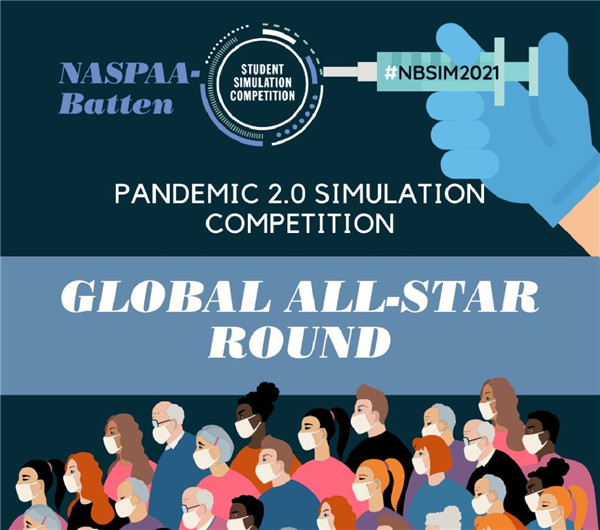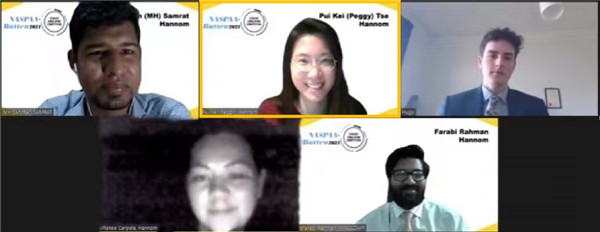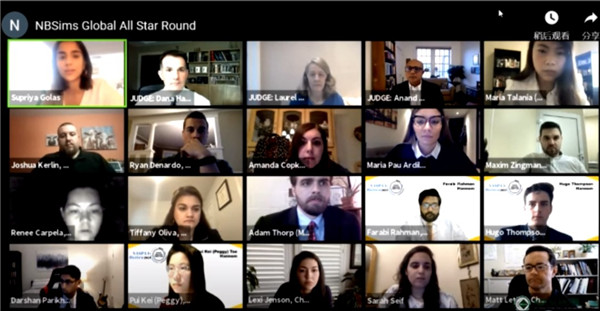
The Network of Schools of Public Policy, Affairs, and Administration (NASPAA) and the University of Virginia Frank Batten School of Leadership and Public Policy have announced the winners of the 2021 NASPAA-Batten Student Simulation Competition. Pui Kei Tse representing the School of Public Policy and Management, Tsinghua University belonged to the First Place Team at the All-Star Round Championship on April 17,2021.
Pui Kei Tse’s teammates are as follows:
● Md. Moajjem Hossain, University of Barishal, Bangladesh
● Farabi Rahman, University of Dhaka, Bangladesh
● Renee Carpela, University of Guam, U.S.A
● Hugo Thompson, Victoria University of Wellington, New Zealand

The champion team
This year, over 400 students from 120 universities in 30 countries took part in the NASPAA-Batten Student Simulation Competition. Participants competed virtually at one of the four virtual competitions hosted on February 27 and March 6, 2021. A total of four regional teams, the competition “All-Stars”, competed for the championship on April 17, 2021. The competition—a partnership between the University of Virginia Frank Batten School of Leadership and Public Policy and NASPAA—annually connects public policy students from a vast network of universities worldwide through simulated gameplay. Developed by experts at the Batten School’s Center for Leadership Simulation and Gaming (CLSG) and backed by real-world data, the simulation places students in leadership roles within a time-sensitive, fast-paced environment where they must work together to minimize the impact of a deadly infectious disease.
“Simulation-based learning is incredibly valuable, as it applies theory to practice, and goes beyond conventional modes of learning,” said NASPAA Simulation Education Director Supriya Golas. “Through these simulations, students can take what they’ve learned in the classrooms and apply it to simulated real-world experiences. We hope these tools will prepare students for the next major global event, whether it’s a pandemic or climate crisis.”
100 participating teams were evaluated on simulation scores, teamwork, organization, policy decision making, and policy presentations. The winning team from each moved on to the global “All Star” round in which a panel of prominent judges identified the global champions.

The global All-Star round is held online
“We’ve extensively updated our simulation to reflect the public health and economic crises brought on by COVID-19,” said CLSG Acting Manager Adam Roux. “It’s a great opportunity for aspiring policymakers to test their leadership, critical thinking, and communication skills against a scenario like the one we are all living through. Experiential learning tools such as the Pandemic Game can help bridge classroom learning and real-world experience, training future leaders to better navigate challenging situations.”
Pui Kei Tse (Peggy) 谢珮琪, EMPA Candidate, Class of 2020, shared her experience during the global round.
“I am truly grateful to be the team leader and “Prime Minister” of my team in the 2021 NASPAA-Batten Competition and winning the Global All-Star round out of 400 participants from 120 universities. Thank you for the support from teachers and advisers at Tsinghua SPPM, who encouraged me to unleash my full potential in the competition.
The theme of this year’s competition is Pandemic 2.0. The simulation game is backed by the latest COVID-19 data, indicating it is very timely and highly relevant to today’s world. My team at the Global All-Star round plays a hypothetical country that resembles India. Given the population size and local context, the effectiveness of pandemic response can become very complex, but my team reached a consensus to adopt a “We Prioritize Health and Safety” approach throughout the game. We believe “the best economic response is a strong public health response”. With our team effort and data analysis skills, we achieved a score of 99th percentile in the simulation game.
The highlight in the Global All-Star round is an intense debate among all four teams. It is a very unique experience that makes NASPAA-Batten stand out from other university competitions. The organizer put up three controversial topics for the teams to debate from their hypothetical country’s perspective. I see it as a healthy exchange of ideas with students across the globe and also a platform to showcase our pandemic response strategy. My team appreciates the diversity of opinion and found good common ground for alignment. We are pleased to have other teams agreeing with us that governments in a pandemic situation should always put people’s interest in the first place.
I strongly recommend students to participate in future episodes of the NASPAA-Batten Competition. Also, I hope to see the concept of simulation learning applied in our everyday classroom for more students to practice public policy applications regularly. This would help our future leaders be more data-driven, effective and responsive to changes.”
About NASPAA: The Network of Schools of Public Policy, Affairs, and Administration or NASPAA is the global standard in public service education. It is the membership organization of graduate education programs in public policy, public affairs, public administration, and public & nonprofit management. Its over 300 members - located across the U.S. and in 24 countries around the globe - award MPA, MPP, MPAff, and similar degrees. NASPAA is the recognized global accreditor of master’s degree programs in these fields.
About the CLSG: The University of Virginia’s Center for Leadership Simulation and Gaming at the Frank Batten School of Leadership and Public Policy prepares students for public life by allowing them to test real-world solutions in a virtual environment. The CLSG designs, develops, and implements cutting edge simulations and experiments to advance education in leadership and public policy; conducts rigorous leadership and public policy research using simulations and experiments; and creates a community of scholarship where faculty, researchers and students are supported in their scholarly efforts related to the methodology of simulations and experiments.

